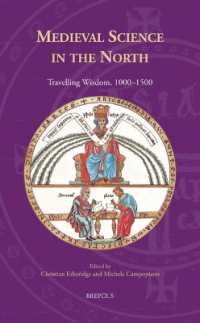- ホーム
- > 洋書
- > ドイツ書
- > Humanities, Arts & Music
- > History
- > miscellaneous
Description
(Text)
Spatial thinking plays a central role in the life of individuals as well as whole societies. It ranges from everyday orientation in our living environment to the social organization of place and space and the structuring of a huge corpus of experiential knowledge by means of theoretical concepts in modern science. Spatial knowledge thereby takes on different forms in different contexts, and it does so depending on the spatial experiences accounted for and the available means for its external representation. From this perspective, scientific spatial knowledge is but one form of spatial knowledge and does not represent a Stratum independent from non-scientific knowledge. This volume presents and analyses manifestations of spatial thinking in various societal and historical circumstances: in the language and practices of recent non-literate societies, in the administrative institutions of early civilizations, in discursive contexts of ancient Greece and China, in early modern natural philosophy and metaphysics, and in twentieth-century physics. It discusses the historical and structural relations of the different forms of spatial knowledge and thereby attempts to address the question of the epistemic status of this knowledge. The series Studies of the Max Planck Research Library for the History and Development of Knowledge is dedicated to key subjects in the history and development of knowledge, bringing together perspectives from different fields and combining source-based empirical research with theoretically guided approaches. Studies typically present working group volumes with integrative approaches. The volumes are available both as print-on-demand books and as open-access publications on the Internet. The material is freely accessible online at www.edition-open-access. de.








